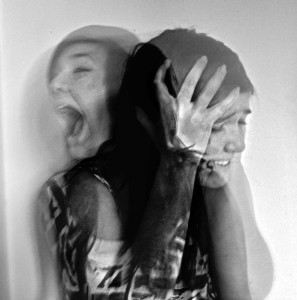
I become aware of a familiar hollowness in my chest, like something has been removed and I don’t know what it is. I feel shaky. I suggest to the participants in the 2-day workshop I am co-training that we take a break, even though it is not time for one. I go outside and begin pacing. I go up and down the sidewalk, turning around in the driveway of the building where the training is being held. I go back down the sidewalk and return to the driveway, pacing in an arc pattern. I do not feel right. I do not know yet what is going on, but it’s obvious that something is wrong. My co-trainer notices and I say I’m not feeling well. She suggests I go home, that we’re halfway through the second day and she can finish it from here. I apologize and thank her, go back inside to get my things, and get in my car and drive off. I cannot sit still in my seat; I feel an overwhelming urge to continue pacing. I feel like sobbing as I’m driving so I keep gasping, trying to stave off the deluge that I know is coming. I should probably pull over but I just want to get home, feeling guilty that I have left my colleague and that, for the first time at this job, I have “allowed” my disorder to affect my work. After what feels like an eternity I pull in my driveway, run into the house, and sob as I pace rapidly around the dining room table, unable to stop myself. I now realize that I am in the middle of a mixed episode of bipolar, and the relentless churning pain in my head makes me want to die.
*
Any employer, co-worker, or client can Google my name and it won’t take them long to discover that I have bipolar. Online, I don’t hide it. In my writing, I try to bring about more awareness of what it means to have bipolar and how it affects people individually. I try to fight the stigma. But the unfortunate truth is that how I present myself online and in my personal life is very different from how I present myself in my professional life. And it’s hard for me to reconcile that.
If I didn’t have bipolar, I wouldn’t have to worry about my colleagues or clients questioning my ability to do my job (read here for details about what I do as a behavior consultant). And despite the fact that on rare occasions it has affected me on the job, I believe that my bipolar enables me to identify with my clients and understand that part of why they feel the way they do and how it affects their behavior. This enhances my ability to provide better ideas for how to support them.
I am one of the lucky ones. In addition to some lifestyle modifications (mostly dietary), I only have to take two medications and they do their jobs well. I rarely experience debilitating episodes (although I would within a few days of stopping my meds). So why don’t I talk about my diagnosis in my place of employment? Why the “don’t ask/don’t tell” stance?
I don’t really have an answer that makes sense, even to myself. Maybe it’s the fear of seeming incompetent. Or being stereotyped by whatever that person’s exposure has been to bipolar, and having to prove that I’m not like that. But I hope at some point I’ll be brave enough to risk being labeled with the stereotype, to start the process of ending the stigma by starting the conversation about it.
*
Maybe my co-trainer had gone online at some point and knew that I had bipolar. I don’t know. Maybe she could just tell that something was wrong, regardless of the cause, and I needed to leave. Since that episode happened, I’ve often wondered (with dread) what I would have done if I had been training the workshop by myself (which is usually the case). I berate myself about it. But emergencies happen. Would I have felt ashamed if, in the middle of the class, I suddenly began to experience severe abdominal pains and could not continue teaching that day? I would have felt bad about needing to stop, but not ashamed. A sudden bipolar episode warrants the same viewpoint. It’s not shameful. It’s not a character flaw. It’s a health issue just like any other requiring medical attention. That afternoon I called my doctor, who prescribed an emergency medication, and I was back to work the next day. Life goes on, and hopefully we are the wiser for it. All of us.
[Image credit: PsychGuides.com]

Thank you for sharing your experience, Tanya. I think it’s so important — not only for those who share what you go through and how you cope, but also for those of us who have no experience of it. We need to hear it. Thank you.
Thank you for your bravery, Tanya. I am not bipolar, but I can relate to your hesitancy to mention your condition to colleagues. There are a couple of things I keep to myself because of the potential stigma involved. You are making it safer for others to be open about their lives. … And congratulations on your upcoming wedding! Hurrah for you!
Thank you for your bravery and education.